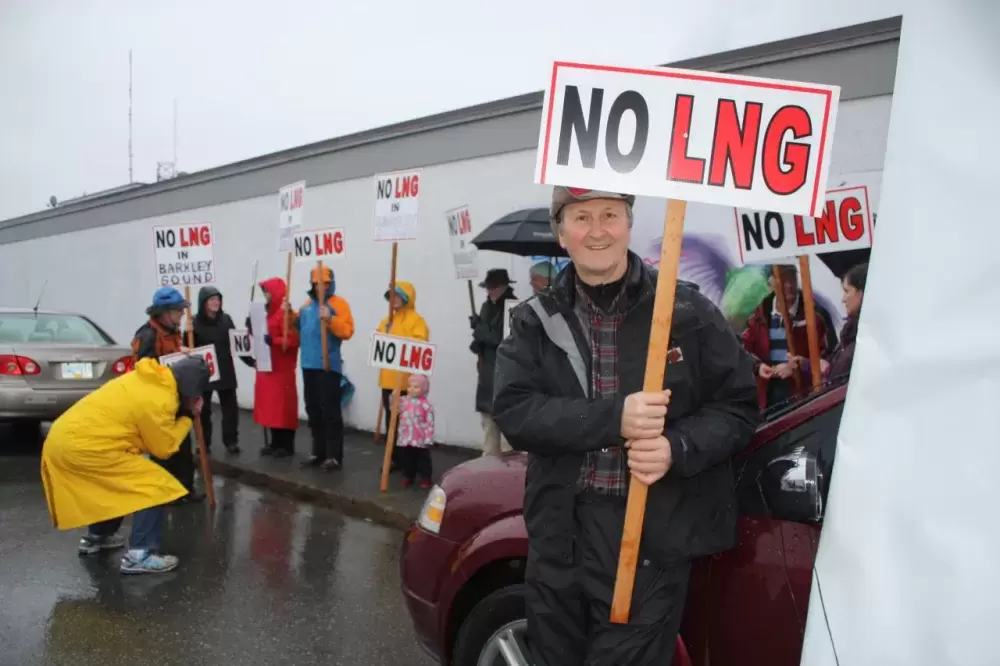A group of about twelve protesters gathered outside the Italian Hall where the Port Alberni Chamber of Commerce was scheduled to hear updates from Steelhead LNG and Huu-ay-aht First Nation. The group, led by ACRD (Alberni-Clayoquot Regional District) director for Electoral Area ‘A’ (Bamfield) Ken Wyton, carried placards stating their opposition to the proposed LNG plant which could be built in Sarita Bay, in Huu-ay-aht traditional territory.
Wyton said they were there to send a message to the proponent, Steelhead LNG, that their group is not in favor of the proposed liquid natural gas plant being considered for Sarita Bay, near Bamfield.
“The proponents are presenting an update to the Chamber of Commerce tonight and this is the first time there has been a push-back from a portion of the community,” said Wyton. “We are letting them know that some people don’t support this.”
Wyton is affiliated with the Barkley Sound Alliance (BSA), an organization opposed to Sarita Bay LNG (Kwispaa) and the Port Alberni Transshipment Hub (PATH).
The BSA says that Steelhead LNG and the Huu-ay-aht First Nations have entered a co-management agreement to develop the Sarita Bay LNG project, named Kwispaa LNG. This is an $18 billion project, requiring as much energy as Site C, which would industrialize Barkley Sound and become B.C.’s largest source of greenhouse gas emissions, said the BSA.
“We want to support Huu-ay-aht First Nations in their aspirations for self-determination but this project has wide impacts. This is more about what is going to happen than it is about who is doing it,” said Wyton.
He went to say that Kwispaa LNG is a major industrial development in Barkley Sound that goes against the Barkley Sound Planning Strategy (BSPS 1994) that recommended there be no major industrial development in the area.
The BSPS was developed in 1994 through the collaboration of fifteen stakeholder groups including government agencies and First Nations. It started as a result of increased development pressures in the area and was an attempt to develop rules about land use, conservation and development in Barkley Sound.
According to the BSPS, the strategy provides the initial framework to guide local planning and decision making on a cooperative, inter-agency basis.
Wyton contends that Steelhead’s proposals are in direct conflict with the BSPS planning principles, goals, objectives, and guidelines.
If the LNG plant were to go ahead, Wyton claims the Sarita estuary would be dredged right down to the bedrock. Wyton says the Sarita estuary is an important resting area for migratory birds and dredging it would have a significant impact.
“The natural values of Barkley Sound should be preserved; it is a very productive area in terms of wildlife,” he said.
Wyton talked about climate change and rising sea levels. He maintains that LNG production accelerates global warming, causing what he calls a slow motion tsunami. “The sea level rise of six feet would be accelerated at a tremendous cost,” he stated.
He believes that Barkley Sound should be considered a special management zone whose primary use is recreation. “It is a natural treasure and we should not undervalue it,” he added.
Wyton says he and his wife moved to Bamfield in 1979 and they also maintain a home in Port Alberni. About half of the protesters that accompanied him are from Bamfield.
“We can say no and still support First Nations,” said Wyton.
He suggested that the region needs a more diverse economic driver that factors in food security and the environment. “We have to stop coming up with ways to degrade our natural systems. We have to stop paving paradise,” said Wyton.







